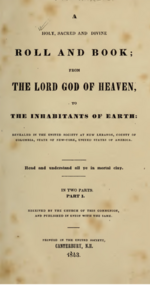
FAIR is a non-profit organization dedicated to providing well-documented answers to criticisms of the doctrine, practice, and history of The Church of Jesus Christ of Latter-day Saints.
SpencerMarsh (talk | contribs) |
SpencerMarsh (talk | contribs) |
||
| Line 25: | Line 25: | ||
===Conclusion=== | ===Conclusion=== | ||
It's clear that comparisons between the Book of Mormon witnesses and the witnesses to Ann Lee's witnesses intended to discredit the former are likely going to be guilty of false equivalency. | It's clear that comparisons between the Book of Mormon witnesses and the witnesses to Ann Lee's witnesses intended to discredit the former are likely going to be guilty of false equivalency. | ||
</onlyinclude> | </onlyinclude> | ||
{{endnotes sources}} | {{endnotes sources}} | ||

One critic of the Church asks how we can believe in the Book of Mormon witnesses and not the witnesses to Ann Lee's A Holy, Sacred and Divine Roll and Book; From the Lord God of Heaven, to the Inhabitants of Earth.[1]
The first point is made succinctly by Matthew Roper. He responded back in 1993 to the same criticism as made by Gerald and Sandra Tanner. He wrote:
The Tanners attempt to downplay the significance of the witnesses’ written testimony by noting similarities between it and several nineteenth-century Shaker writings in which some Shaker believers claimed to have seen angels and visions. “Joseph Smith only had three witnesses who claimed to see an angel. The Shakers, however, had a large number of witnesses who claimed they saw angels and the book. [In Shaker writings,] there are over a hundred pages of testimony from ‘Living Witnesses.’ “[2] But the quantity of witnesses has little meaning if those witnesses afterwards admit that they were wrong. Unlike the Book of Mormon, the Shaker Roll and Book afterwards fell into discredit and dishonor among the Shakers themselves and was abandoned by its leaders and most believers,[3] while the Book of Mormon continued to be a vitally important part of Mormon scripture to which each of the witnesses, including Martin Harris, continued to testify, even while outside of the Church.[4]
When comparing the testimonies of the experiences of the Book of Mormon Witnesses and the Shaker witnesses, Brian Hales offers this easy-to-read chart:

As author Jim Bennett observed about this criticism:
So we shouldn’t accept the testimony of Book of Mormon witnesses because the Shakers, who no longer exist and who’s central claims have been completely discredited by the passage of time, claimed to see angels? How is that anything but a non sequitur? Each testimony should be evaluated on its own merits. As it stands, the Shakers no longer exist, so I don’t see much value in reviewing their testimonies.[5]
It's clear that comparisons between the Book of Mormon witnesses and the witnesses to Ann Lee's witnesses intended to discredit the former are likely going to be guilty of false equivalency.

FAIR is a non-profit organization dedicated to providing well-documented answers to criticisms of the doctrine, practice, and history of The Church of Jesus Christ of Latter-day Saints.
We are a volunteer organization. We invite you to give back.
Donate Now